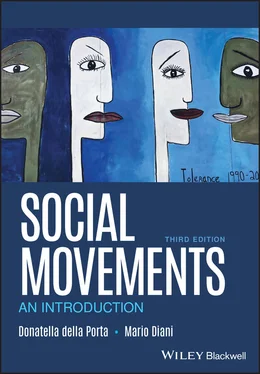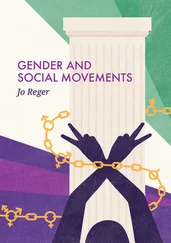1 ...7 8 9 11 12 13 ...28 For example, political parties also face the problem of mobilizing their members and providing them with incentives to join and somehow support the organization – if anything through the payment of membership fees; so do interest groups only minding the sectoral – often, very parochial – interests of their specific reference groups (Jordan and Maloney 1997; Knoke 1990). Likewise, even political parties or narrow interest groups focus face the problem of adapting their strategies and tactics to changing environments, as the context in which they operate may become more or less favorable, such as through changes in the attitudes of power holders toward specific parties or interest groups’ demands, changes in legal opportunities for interest representation, or changes in the cultural models with which ordinary people make sense of their political and social world (Panebianco 1988). From a different angle, many voluntary organizations do not identify any social or political opponent to protest against, and their strategies focus entirely on service delivery rather than advocacy, political representation, or challenges to dominant norms or lifestyles. Even these organizations, however, still face problems of attracting and keeping members, securing the resources necessary to promote action, elaborate the cultural models necessary to pursue goals along the desired lines, and framing their issues in order to make them as attractive as possible to the widest audience as possible (Wilson 2000).
As it happens, analyses of social movements and analyses of collective action at large are inextricably linked. Let us say that the experience of social movements reflects phenomena with more than passing analogies to other instance or political or cultural collective action, taking place within political parties, interest groups, or religious sects. Therefore, when we analyze social movements, we deal with social processes that may also be of interest to researchers who do not define themselves at all as social movement analysts. Accordingly, we feel that a lot of what is presented here may be of interest to a much broader audience.
Recently, there have been several attempts to synthesize scholarship on social movements with the aim of linking it to broader theoretical and/or empirical concerns. Some of these attempts have aimed at integrating social movement theory with general sociological frameworks.
A most ambitious development by social movement scholars, openly criticizing the insularity of the social movements studies community, and also drawing heavily on non‐Western materials, has been the Dynamics of Contention (DOC) program (McAdam et al. 2001). The main suggestion coming from this approach has been the possibility to combine the knowledge developed in the fields of social movements with those elaborated on revolutions, democratization, and ethnic conflicts, singling out a field of contentious politics, defined as “episodic, public, collective interaction among makers of claim and their objects when (a) at least one government is a claimant, an object of claims, or a party to the claim and (b) the claims would, if realized, affect the interest of at least one of the claimants” (McAdam, Tarrow, and Tilly 2001, p. 5). As Sidney Tarrow (2015, p. 90) summarized, the contentious politics approach focused on episodes of contention, rather than on individual social movements, looking at the relations of different actors within complex political processes. Advocating a dynamic rather than static use of concepts, the scholars involved in this project have tried to single out general mechanisms of contention, defined as “delimited changes that alter relations among specified sets of elements in identical or closely similar ways over a variety of situations” (McAdam, Tarrow, and Tilly 2001, pp. 24–25). While criticized for the uncertain status of the concept of causal mechanism as well as for the lack of capacity to account for causes and effects of social movements, the contentious politics approach has rightly pointed at the importance to bridge the field of social movements to other cognate fields (see Diani et al. 2003; Tarrow 2015 for discussions of the approach).
1.2 WHAT IS DISTINCTIVE IN SOCIAL MOVEMENTS?
If the core questions addressed by social movement analysts are not necessarily specific, one can wonder whether social movements have an analytical peculiarity that justifies the development of a distinctive field of research. In order to address this question, we have to discuss the concept of social movement.
1.2.1 The Concept of Social Movement
In a number of pieces, Mario Diani (1992, 1995, 2013; Diani and Bison 2004) has portrayed social movements as a distinct social process, characterized by the fact that actors engaged in collective action:
hold conflictual orientations to clearly identified opponents.
connect through dense, informal networks connect them.
share a distinct collective identity.
We can look at these actions in more detail:
Conflictual collective action. Social movement actors are engaged in political and/or cultural conflicts, meant to promote or oppose social change. By conflict we mean an oppositional relationship between actors who seek control of the same stake – be it political, economic, or cultural power – and in the process make negative claims on each other – i.e., demands which, if realized, would damage the interests of the other actors (Tilly 1978; Touraine 1981, p. 80–84). Accordingly, addressing collective problems, producing public goods, or expressing support to some moral values or principles does not automatically correspond to social movement action; the latter requires the identification of targets for collective efforts, specifically articulated in social or political terms. For example, collective action challenging austerity policies in countries like Greece (Kotronaki 2013; Seferiades 2013; Diani and Kousis 2014) is conflictual to the extent that organizations like the European Commission or the International Monetary Fund are blamed not because of their officials’ misconduct or specific policy mistakes, but as representatives of distinct coalitions of interests. When collective action focuses exclusively on the behavior and/or the legitimacy of specific individuals, or blames problems on the humankind as a whole, on natural disasters or divine will, then it is difficult to speak of social movement processes (Melucci 1996, Part I).
Dense informal networks. Dense informal networks differentiate social movement processes from the innumerable instances in which collective action takes place and is coordinated mostly within the boundaries of specific organizations. A social movement process is in place to the extent that both individual and organized actors, while keeping their autonomy and independence, engage in sustained exchanges of resources in pursue of common goals. The coordination of specific initiatives, the regulation of individual actors’ conduct, and the definition of strategies all depend on permanent negotiations between the individuals and the organizations involved in collective action. No single organized actor, no matter how powerful, can claim to represent a movement as a whole. It follows that more opportunities arise for highly committed and/or skilled individuals to play an independent role in the political process, than would be the case when action is concentrated within formal organizations.
Collective identity. Social movements are not merely the sum of protest events on certain issues, or even of specific campaigns. To the contrary, a social movement process is in place only when collective identities develop, which go beyond specific campaigns and initiatives. Collective identity is strongly associated with recognition and the creation of connectedness (Pizzorno 1996; Tilly 2005). It brings with it a sense of common purpose and shared commitment to a cause, which enables single activists and/or organizations to regard themselves as inextricably linked to other actors, not necessarily identical but surely compatible, in a broader collective mobilization (Touraine 1981). For example, research on environmentalism suggested that animal rights activism were more distinctive and less identified with environmentalism in Britain than in Italy: as a result, it made much more sense to regard the two as involved in the same movement process in the latter than in the former (Rootes 2003). Likewise, not all networks between people holding similar beliefs and orientations necessarily reflect social movement processes: for example, the international Zapatista support network was not regarded by all analysts as a social movement because of the lack of a focused identity and the resulting bonds, even though resources of solidarity certainly circulated through it (Olesen 2004)). Even people who participated in major events like those that ultimately led to the demise of president Mubarak in Egypt in 2011 did not necessarily share long‐term identities beyond the common goal of toppling the dictator (Sowers and Toensing 2012; Diani and Moffatt 2016).
Читать дальше












